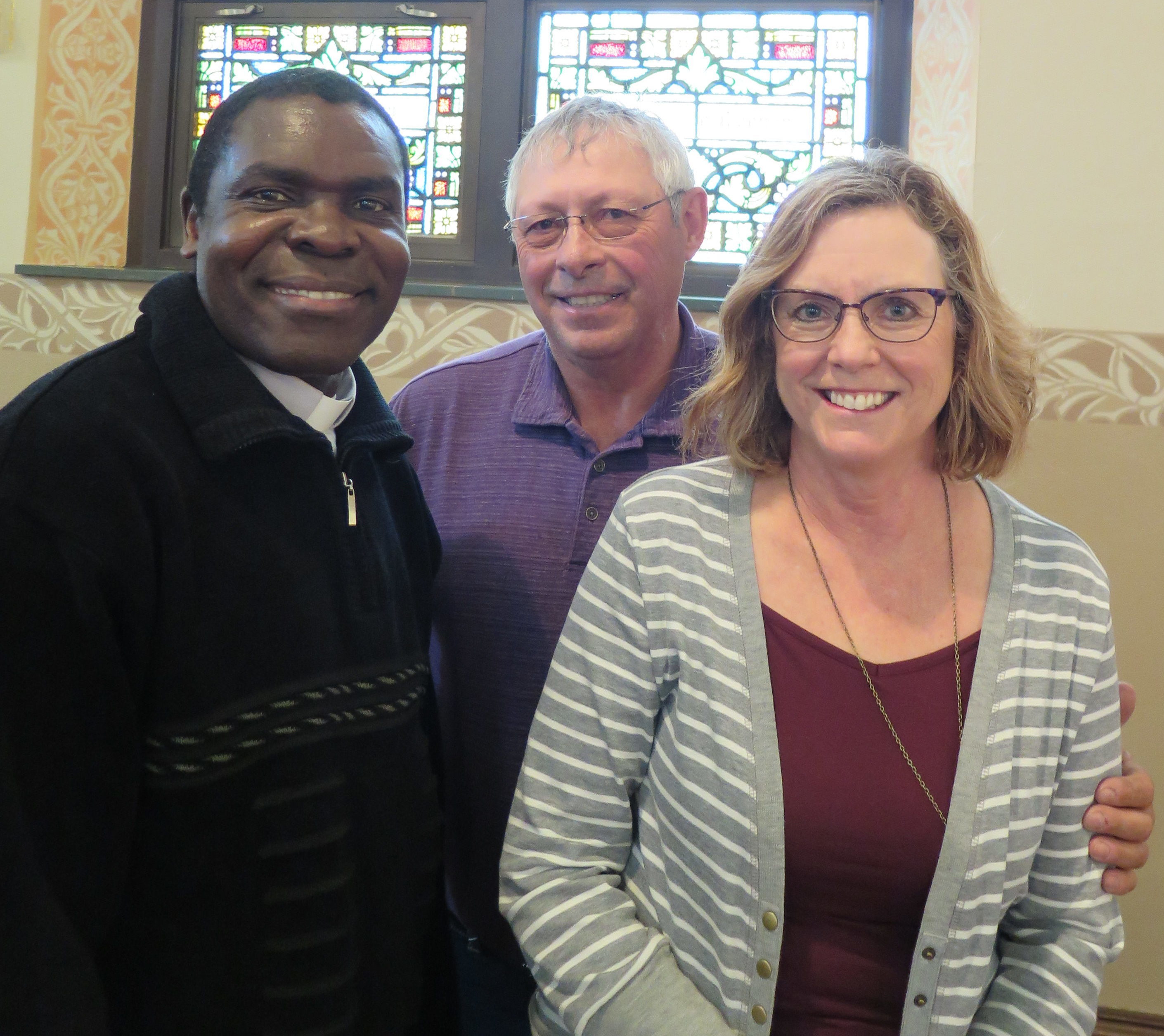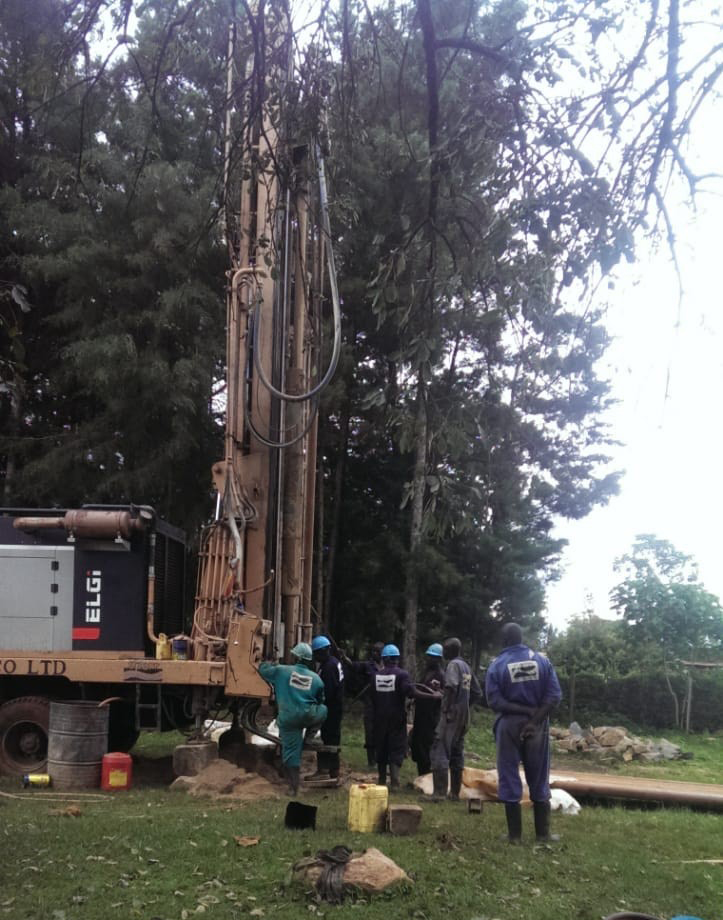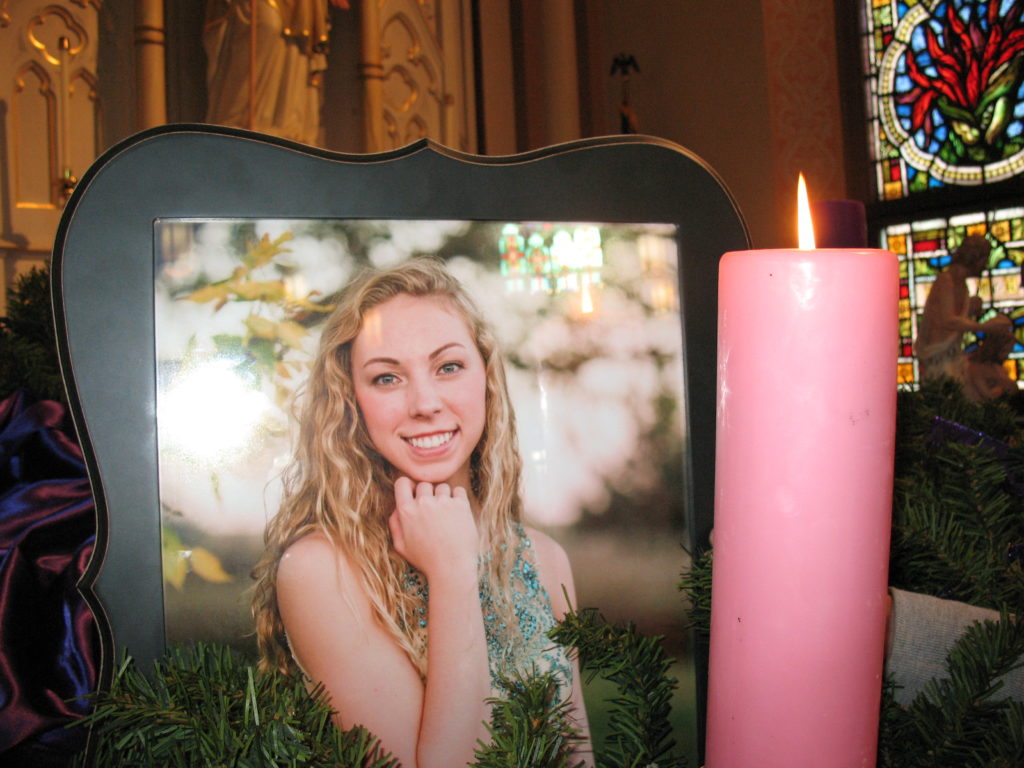
Father Vincent Sunguti is the parish administrator of St. Joseph Parish in Wisner, where Carol and Dave Oligmueller are members. The Oligmuellers were instrumental in providing the funds to construct a new well in the home village of Father Vincent in memory of their daughter. LARAYNE TOPP
News
Nebraska Catholics provide life-giving water to Kenyan village
January 9, 2020
By LaRayne Topp
For the Catholic Voice
Women line up at a spring in Kenya, buckets on their heads, before kneeling before a rock-rimmed pipe from which a small stream of water flows.
A ring of soft material pads the space between the buckets and the women’s heads, because water can get heavy. It’s especially heavy when walking three or four miles to the closest place to find clean drinking water, and then back home again.

Workmen are seen at the drilling site for a new village well at Koromaiti, Kenya. The project called for months of filling out agency paperwork, construction, testing and waiting for the well to become a reality. COURTESY PHOTO
In years past, women carried water in jars of clay. When it comes to fetching water in rural Kenya, not much has changed. But in 2019, due to the kindness of strangers, a new water well has graced the village of Koromaiti in the west central part of the country. Clean water can now be obtained with the flick of an electrical switch.
Father Vincent Sunguti grew up near this village; his current home is Wisner, a small town in the Archdiocese of Omaha. He serves as the parish administrator at St. Joseph Parish in Wisner and Holy Cross Parish in Beemer, the only priest of color in the history of the two faith communities.
Father Vincent is on loan from the Diocese of Eldoret in Kenya. He describes himself as a fidei donum (“gift of faith”) priest, reflecting the title of Pope Pius XII’s 1957 encyclical letter in which he exhorted bishops throughout the world to send priests as missionaries to other continents to share in the work of evangelization.
When he left his homeland in 2011 to study in America, his fellow villagers asked him, “Can you get us water?”
Water is a precious commodity in Kenya. Many shallow wells are dug by hand. During the rainy season, from March through September, those wells provide easy access to water. In addition, Kenyans harvest water from the gutters attached to their roofs. But by December, when winds blow dry over the land, those water sources dry up, and Kenyans are forced to walk many miles to a river or spring.
DECISION TO DRILL
Clean water is taken for granted in Nebraska where Dave and Carol Oligmueller make their home. They are members of St. Joseph, but they farm and raise cattle in nearby Pilger. Unlike the villagers in Kenya, even the Oligmuellers’ livestock have an abundant supply of fresh water each day.
It was from Father Vincent that Dave Oligmueller learned about the scarcity of water in Kenya, and it was from the Oligmuellers that Father Vincent learned about their daughter, Jayda Marie. The 18-year-old was killed in a traffic accident in March 2017, the year before Father Vincent arrived at the Oligmuellers’ parish.
Jayda Marie loved helping people, her parents recall, and in her memory the Oligmuellers chose to help the village of Koromaiti. With assistance from the Mike and Tammy Ridder family of Fullerton, they began the process of drilling a well halfway around the world.
Father Vincent was thrilled to hear the plans. “I was for five years waiting,” he said. “In my heart, I knew God had answered our prayer.”
In January 2019, while on vacation in Kenya, Father Vincent visited his home church, St. Charles Lwanga Parish in Chekalini. While celebrating Mass, he brought news about the new well himself.
“We have good friends in the United States …,” he began. His announcement was drowned out by applause.
ALL’S WELL THAT ENDS WELL
Father Vincent turned over the actual installation of the new well to his younger brother, Henry, a Catholic Augustinian priest serving in Kenya. The process took a little longer than expected with a number of agencies to approach, including governmental geologists who decided where to dig, plus the National Environmental Authority. But eventually all went well.
“At times, things can be slow here,” Father Henry explained.
After filling out mounds of paperwork and receiving permission to begin, a 100-meter-deep well was dug. Lab tests were carried out and the water proved to be good for human consumption.
“After erecting the water tank stand, we had to leave it to dry completely before mounting the tank,” Father Henry said. They fitted the well with a submersible pump, and they plan to build a small security house around it. “Then we shall be good to go,” he said.
The well is powered by electricity, but was designed so that it can be switched to solar power in the future. This would be less expensive in the long run, Father Vincent said. A plaque at the well house will signify that the project was completed in memory of a girl from the United States, Jayda Marie.

The life of Jayda Marie Oligmueller was taken in a traffic accident in March 2017. She loved helping people, her parents say, and in her memory they chose to help the village of Koromaiti, Kenya, by installing a new well to provide easily accessible, clean drinking water. LARAYNE TOPP
Piping was run to the St. Charles Health Center, which offers round-the-clock maternity care and serves an area of around 25 square miles. The well will also be welcomed by the 800 worshippers who regularly attend St. Charles Church, and the 400 students studying at the parish elementary school.
“Above all, we are so grateful to the family of Oligmuellers for the great donation in memory of their daughter Jayda,” Father Henry said.
KNOWING HARDSHIP AND SORROW
The Oligmuellers marveled at how God has worked out the details. Just as Father Vincent knew little about the northeast Nebraska communities of Beemer and Wisner, the Oligmuellers knew little about Kenya, where Father Vincent grew up as the fifth of nine children.
When his father took a second wife and went to live with her, he no longer provided financial assistance for the youngest six children. That was left to the children’s mother. She and her children labored in the fields of neighboring farmers. Altogether they were paid $2, an amount that would buy cornmeal for the day.
In addition, Father Vincent’s mother farmed three acres of her own, planting corn, beans and sunflowers, which they sold for the oil. Three milk cows provided milk for the family, plus a little to sell. From such a background, Father Vincent came to understand poverty, hardship and sorrow.
Dave Oligmueller explained it this way: If Father Vincent hadn’t arrived in Wisner when he did, and shared in the Oligmueller family’s sorrow, and if he hadn’t shared his own sadness on the unavailability of water in his homeland, the well would not have become a reality.
“It gives you a reason to believe that God does what he does with a purpose for his good,” he said.
Father Vincent compares the gift of life-giving water to the gift of Jesus himself. “The coming of Jesus is to give people hope in life,” Father Vincent said, “and water is life.”
Out of Jayda Marie’s death, the entire community at Koromaiti will benefit. “When you do something like this, you make that person live again,” Father Vincent said. “Jayda’s legacy will live on through the well. It’s all about love and concern and caring.”
It’s the kind of love that Christ gave, opening the hearts of Nebraska families to provide easily-accessible water to the brothers and sisters they’ve yet to meet on the other side of the world.